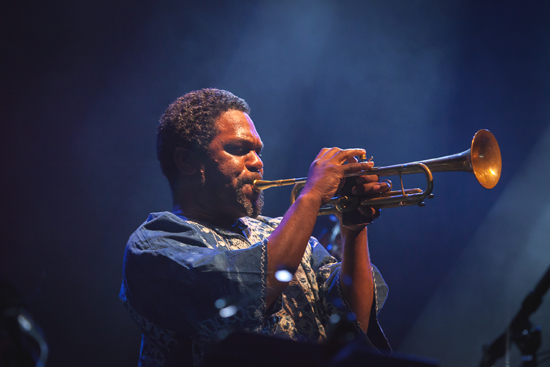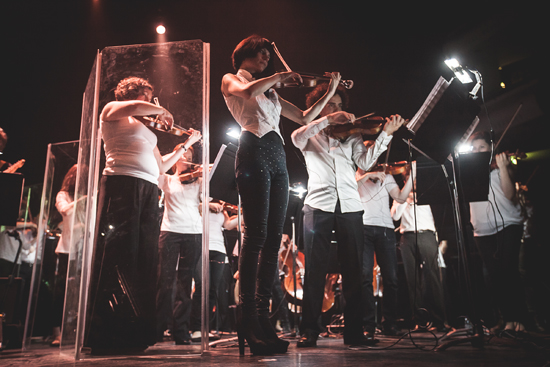Photos by Victor Frankowski/Southbank Centre
Joshua Homme
Royal Festival Hall
"You got somewhere to go?" enquires Josh Homme of one unfortunate audience member who elects to visit the boys’ room midway through a mesmerising cover of Johnny Cash’s ‘Dark As A Dungeon’. The reply is inaudible, but Homme’s quip is beautifully timed: "Yeah, well, I thought your first three albums were the best, too!" Then, in the blink of an eye, Homme picks up where he left off, to strum his acoustic guitar and breathe new life into Cash’s song. If any one moment encapsulates tonight’s triumphant performance then this is it. Musician, singer and wit, this is a rare opportunity to witness Homme stripping back not only his own fine back catalogue but also a number of well chosen readings of other people’s material. Oozing charisma, Homme proves to be highly engaging company, with an utterly compelling performance and a finely tuned sense of humour that suggests an alternate career on the comedy circuit.
Last album … Like Clockwork saw Queens Of The Stone Age deliver their masterpiece and fill arenas and festivals the world over; with that, their transformation from cult concern to planet-shagging behemoth was complete. Sounding more muscular than at any point in their career, the band’s brand of motorik rock & roll laid waste, as the Queens machine rolled inexorably from one continent to another. Yet tonight we see another side to Josh Homme as his lays himself, and those songs, bare.
Taking to the stage in a blue suit, white shirt and comfy slip-ons, Homme delineates from the swagger of Queens Of The Stone Age in just a few paces. The stage itself is sparse: just three guitars, a grand piano, some keyboards, a couple of amps placed at the back and some mic stands at the front. A single yellow spotlight illuminates the performance area and as Homme settles down with his acoustic guitar to open up with a tender ‘Long Slow Goodbye’, the effect is akin to an after-hours jazz club or recording studio once the other musicians have left. The only thing missing is a long plume of cigarette smoke trailing from an overfilled ashtray. But what is present and correct is that voice, channeling the blues, pain and emotion as it effortlessly glides from tenor to falsetto. The bombast of Queens Of The Stone Age often puts Homme’s singing voice in the shade, but here it takes centre stage to become a beautiful instrument in its own right.
It’s the voice and declamation that prevent his version of Dean Martin’s ‘Memories Are Made Of This’ from falling into hokey territory. But there’s also Homme’s own brush with mortality that informs this rendition. It’s impossible to come sailing so close to death without taking stock of what’s important and meaningful, and the song, via Homme’s measured and straight-faced singing, is given another new dimension. It also harks back to another age when singers would regularly engage with their audiences between songs. Homme’s gags, one-liners and interaction with the Royal Festival Hall adds to the intimacy. Add in the urbane sips of red wine between songs, and this starts to feel like a one-to-one performance. He even makes light of a new song, ‘Villains Of Circumstance’, that makes an appearance tonight. "I wrote this one about thirty minutes ago," he deadpans, before adding, "So I might just fuck it up." He doesn’t, and what we’re presented with is extension of … Like Clockwork‘s confessional mode. Quite how it will end up on record is anybody’s guess, but right here, right now, it straddles both blues and jazz to beguiling effect.
Homme’s use of comedy is almost like a reflex action against the weight of the lyrics. Cash’s ‘Dark As A Dungeon’, probably most famous for its appearance on Live At Folsom Prison, is introduced as coming from, "…one of those albums where he plays for a bunch of convicts. Totally not like tonight." Similarly, his introduction of Troy Van Leeuwen with "What would a solo show be without other people?" is met with unrestrained gales of laughter. But the real treat occurs with the arrival of Mark Lanegan. Wearing a suit and glasses, he resembles someone who has accidentally stumbled on stage while looking for the nearest UNIX conference, but their harmonies on the haunting ‘One Hundred Days’ create a beautiful moment, as Lanegan’s tar-thick growl melds with Homme’s hints of vulnerability.
As evidence by his performance of Marty Wilde’s ‘Bad Boy’, Homme isn’t above poking fun at his own reputation as an all-consuming party monster, but you’re left with the sense that ‘The Vampyre Of Time And Memory’ is closer to where his head is at. Taken as a whole, this magnificent performance gives another insight into a singular artist; this is Josh Homme the man, not the unreconstructed rock pig on which much of his reputation is based. Consequently, what might on paper could have been a throwaway evening is turned into one of the finest concerts of his I’ve witnessed, and one that will remain in the memory for as long as Queens Of The Stone Age at their most explosive. Let’s do it again sometime. Julian Marszalek
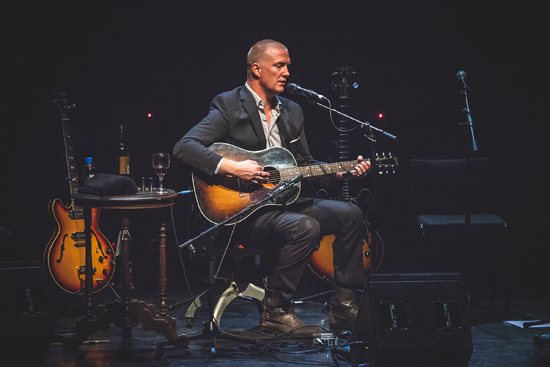
James Holden + Not Waving
Purcell Room
There’s a nice synergy in the line-up for tonight’s show: Not Waving is the solo project of Walls’ Alessio Natalizia, and James Holden placed Walls’ ‘Gaberdine’ on his genre-smashing (and perhaps career-defining) contribution to the DJ-Kicks mix series. Natalizia returns the favour with an opening set of hazy, slightly sinister ambience, accompanied by some provocative videos of butchers at work and so on. The menace that bubbles under the silky surface of Not Waving’s krautrock-ish arpeggios never quite breaks through, which perhaps makes it all the more disconcerting; as we’re leaving the Purcell room for a quick Pimm’s during the intermission, there’s a palpable sense of bafflement at what Natalizia is trying to achieve.
James Holden might be more of a known quantity for tonight’s audience, who seem well-versed in his more recent work – the overwhelming sense is that nobody expects him to bust out early trance hit ‘Horizons’ or his remix of ‘The Sky Was Pink’. Yet despite the large bank of analogue synthesiser modules connected by a tangle of patch cables, there’s a small surprise in Holden choosing to work with a live drummer, RocketNumberNine’s Tom Page. After all, Holden’s most recent album, The Inheritors, favoured heavily processed drum machine sounds, more soft pulses and blown-out 808 kicks than the crispness and clarity of a real drum kit. Yet from the moment the show starts both Holden and Page show how well this combination of synthesised instrumentation and live drumming can work. Much of this comes down to Page, whose fluid, jazz-influenced style works as a perfect foil to Holden’s knotty melodies and tricky time signatures. Live drumming with electronic music has become a little played-out of late, and it has favoured a very forceful, rigid style of percussion (think The Presets live, or Shy Child). Holden has, of course, never been one for playing to type, so it’s refreshing to see him tackle this slightly shopworn combination and bring it to life again.
The show moves swiftly through highlights from The Inheritors, and makes each song sound like even more of a contained maelstrom than they do on record (no mean feat). ‘Rannoch Dawn’ gets soaked in feedback and noise, while Page pushes its rhythm forward with a mean schaffel stomp; the cascading synth melody of ‘Gone Feral’ threatens to spin out of control; and Etienne Jaumet’s sampled saxophone on set closer ‘The Caterpillar’s Intervention’ comes through with such aggressive skronk that it reminds this reviewer of the damaged sax-lead noise group Zs. It’s a real shame that Jaumet can’t be here tonight to play it live. Holden may love to disdain expectation, but he’s thoroughly lived up the suspicion that he would deliver a surprising, inventive, and satisfying live show. Chad Parkhill
Glass Animals
Production Arch
I first came across Glass Animals at around 4am after a night shift, as first light filtered through the night sky – the optimum time to discover such a band. When whirring mind and tense body are feeling the strain of an all-nighter, their music is a potent opiate, a sultry, nocturnal sound that belongs to the darker spaces. Tonight it’s given the perfect stage, deep in the belly of the Royal Festival Hall, sealed from natural light and the crowds floundering above in the Southbank’s June sunshine. This show follows the Oxford quintet’s recent release of Zaba, an assured, invigorating album that pulses and swelters with eleven otherwordly tracks, layered with gentle electronic beats, psychedelic synths and an R&B slow-jam sensibility. The tunes are sumptuous, dark, playful, erotic and bizarre. It’s mesmerising stuff, all infused with a certain tropical sound, heady, humid, ritualistic. Frontman Dave Bayley is a neuroscience graduate who worked with psychiatric patients, experiences channeled into his Freudian tales and hallucinatory minglings of sex, desire, snacks, narcotics and bodily functions.
The band emerge onto a foliage-filled stage in the Hall’s subterranean Production Arch space – as sticky and aptly oppressive as the rainforest – and open with the swaying rhythms and sweet harmonies of ‘Psylla’. The room is dark, save the occasional flash of sickly green light from the stage’s LED strips. ‘Walla Walla’ swirls with menace, evoking a desolate, nightmarish road from through militarised desert landscapes, before ‘Wyrd’ conjures up the same ominous atmosphere in a witch’s dance of ritualistic percussion and hissing vocals. The sludgy bassline, chromatic clinks and plucked sweep of strings of ‘Black Mambo’ offer a beautiful and hypnotic juncture, while ‘Toes’ shows off the band in all their woozy, lascivious glory.
Throughout, Bayley’s breathy, snarling falsetto is pitch-perfect. The band play with restraint and subtlety, making careful use of silence, and exploding with noisy distortion after building the climactic peaks to breaking point. The set veers between the cerebral and the danceable – with Bayley shaking his tambourine like a mad-for-it 90s raver one moment, and the next holding court with inventive lyrics that toy with the surreal and the subconscious.
Sadly, the show falls apart before they can close with ‘Gooey’, their luscious shimmy of a single. As the set approaches its end, a chunk of metal dislodges from the ceiling and crashes onto the stage. The band are forced off, and health and safety concerns prevent their return. It’s an anticlimax and a disappointing conclusion; the audience shuffles towards the fire exit and the band disappear into their portable ecosystem of trees and bushes. A tweet from them the following the day reads: "no one was hurt but the venue rightfully wouldn’t let us continue. BIG thank you…and we owe you gooey." Jack Losh
Mica Levi’s Under The Skin live
Royal Festival Hall
For anyone, like myself, who has often entertained fantasies involving tar, a beautiful, heartless woman and the feral backstreets of Glasgow, Jonathan Glazer’s Under The Skin is not only a godsend but also a stark warning not to take a lift to the nearest Tesco’s from a woman in a white Transit van. Nefarious reveries aside, the film is a startling exercise in extreme aesthetic alienation, one made even more dislocating through Mica Levi’s astonishing score, performed live with the film at the Royal Festival Hall.
Levi and her orchestra situate themselves directly beneath the film’s screening, which serves to exacerbate the unreality of what we’re witnessing; just as the aporias of our nameless (e)stranger’s inhuman quest begin to beguile and bewitch, we see the orchestra begin to twitch and move for their instruments and start to play, hurling us our of our terra incognita drift and back to some form of reality. This mirrors Scarlett Johansson’s character and her gradual intrigue in human emotion and mortal habits, an intrigue which takes her into unchartered territories. Levi’s score is with her, and with us, every step of the way, acting as a sort of interlocutor between image and illusion, especially important for a film with minimal dialogue. The synching is impeccable, the performances measured and precise, and the effect never anything other than extraordinary. Colm McAuliffe
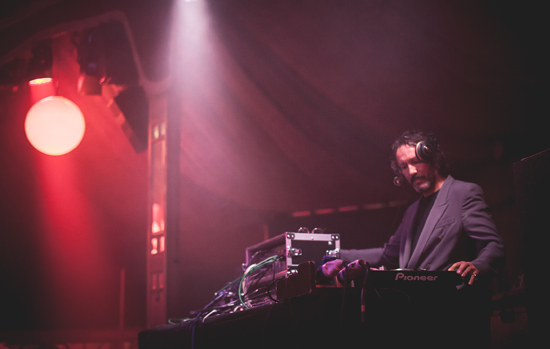
DJ Harvey
Wonderground’s Spiegeltent
"So long as time and care and love is put into the party, you can still have something that is as good, if not better, than it’s ever been," DJ Harvey told the Quietus prior to his appearance at London’s Oval Space in 2012. That devotion to getting the party right helped tickets for this Meltdown gig to sell out in less than fifteen minutes. We had last experienced Harvey’s attention to detail at Lovebox, and the thought of him playing to 300 people in a wooden floored circus tent made this an eagerly anticipated Meltdown event. There aren’t many DJs who could trump an England World Cup game. But as one fellow DJ exclaims prior to the gig, "England will always let you down. Disco never does." It’s sage advice, which the crowd already filling the tent around kick-off time has heeded. As the first of many obscure disco rarities resonates through the warm sound system, more dancers are drawn inside. It’s just one of the many tracks that provoke the most ardent spotters to ask: "what is that?"
It’s not just about playing rarities, though. Harvey’s programming and sequencing tonight is fantastic, moving from a half-familiar space disco epic into Barry White’s ‘I’m Qualified to Satisfy You’. Playing with a soulful intensity, his use of EQ is measured and inspired, enhancing musical passages and riding the peaks wonderfully. Like the DJs such as Larry Levan who inspired him, Harvey is a master of drama. And as a performance artist takes to the stage dressed as a giant white dove, Harvey works the crowd into frenzy with the leftfield disco of ‘Martin Circus’. But the biggest reaction of the night comes with an edit of Brenda & Herb’s stunning version of ‘I Who Have Nothing’. The smile on Harvey’s face says it all as hundreds of hands go up in the air from a crowd singing the refrain "I love you, I love you, I love you, I love you’. Care and love indeed, from a DJ who really does deserve the hype. Andy Thomas
Nick Zinner – 41 Strings
Queen Elizabeth Hall
The second Friday night of Meltdown sees Yeah Yeah Yeahs guitarist Nick Zinner pull in a host of guest musicians – including collaborators Hisham Bharoocha and Ben Vida, YYYs bandmate Brian Chase, Savages’ Gemma Thompson and members of The Magic Numbers, The Good the Bad and the Queen and Deap Valley, alongside a battalion of strings players from Goldsmiths and the Southbank Sinfonia – for the third-ever performance, three years after its New York debut, of his four seasons-themed Earth Day celebration piece 41 Strings.
Zinner is clearly taken by the possibilities offered by working with a sizeable cohort of classical musicians, using his violinists to create majestic, guitar-backed swells, flecked with delicate descending scales. On the night, 41 Strings is powerfully executed and attracts a standing ovation from an audience admirably unflustered by the unexpected sight of an interloper climbing onto the stage, to toss something (dead flowers?) at the feet of Zinner and co. late on. But if those full-blooded orchestral moments represent the performance’s most overtly impressive aspect, they are undermined by Zinner’s unfailing tendency to employ them. Rather than echoing the drama and unpredictability of Vivaldi’s Four Seasons, where summer erupts into thunderous cloud-breaks (it’s hard not to make the comparison), 41 Strings builds inevitably towards soaring, violin-led euphoria. As such, there is little room for subtlety, and certainly nothing like the creeping iciness of Mica Levi’s performance, in the same venue two days previously, of her taut and understated soundtrack to Jonathan Glazer’s Under The Skin. With the exception of ‘Spring’, whose wall of rumbling guitars and punchy bass breakdown are appropriately busy, Zinner’s seasons are a little too interchangeable.
According to Zinner, his intention was "to make something that’s good and has some sort of emotional resonance, something that’s easy to connect with." These noble aims are hampered by their lack of specificity. Remaining true to Zinner’s mission statement, 41 Strings is enthusiastically performed and often thrilling, but it struggles to surpass its atmosphere of non-specific good feeling that could accompany anything from Earth Day-inspired global unity to euphoric television montages of summer sport. The piece was originally commissioned by an organic clothing brand to help mark their Earth Day celebrations; it’s a shame it spends so much time sounding that way. Paul Tucker
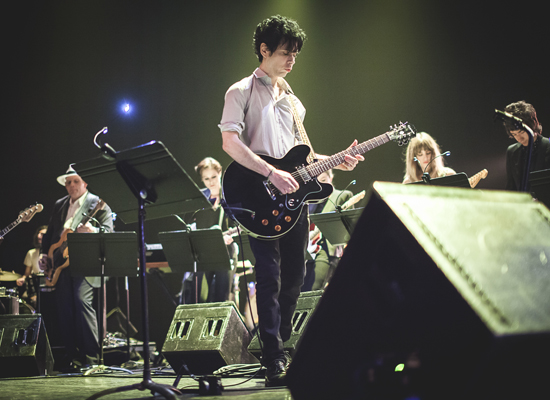
ESG + 23 Skidoo
Queen Elizabeth Hall
"I don’t feel like a disco group, I don’t feel like a punk group, I feel like a funk group, maybe like Rick James says, punk funk. I feel we’re right here, in between, we’ve got something for everybody." Speaking to Collusion magazine in 1983, Renee Scroggins described the hybrid music she and her teenage sisters created out of the South Bronx in the early ’80s. More than 30 years on, this most influential of groups are back in London.
Before ESG, one of the UK’s most cultish post punk bands 23 Skidoo remind us why they are still so revered. The rhythmic assault of ‘IY’ and ‘Kundalini’ sound as ominously funky today as when they appeared on the Seven Songs album back in 1982. With the Turnbull brothers joined by original guitarist Sam Mills and vocalist Tom Heslop, the tracks off that monumental LP are particularly strong tonight. And so, although the killer breaks of ‘Coup’ (as sampled by The Chemical Brothers) receive the biggest cheers, it’s ‘Vegas El Bandito’ that catches the band at their claustrophobic and hypnotic best, while scratch video projections of Richard Heslop provide another edge to their confrontational and exploratory sound.
The last time I saw ESG perform, it was around the time of their Soul Jazz compilation A South Bronx Story. That was in front of a raucous crowd of ex-punks and aging clubbers in the raw surrounds of Islington’s Electrowerkz, so it’s hard to tell what to expect from the all-seated QEH gig. We needn’t have worried; the moment the minimal bass and drums of ‘You’re No Good’ echo around the hall, the crowd respond with a huge roar. Renee’s voice is as forceful as ever tonight, and when she instructs the crowd to ‘Dance’ they respond. The records ESG released on Ed Bahlman’s 99 Records were somehow apart from the other bands emerging from the New York underground. Pure, untainted, and primal, theirs is a sound that hasn’t wilted with age. Renee once referred to the "savage drive" of their beats, and you can hear what she meant in the raw funk of old classics like ‘The Beat’ and ‘Come Away With Me’. While ‘Moody’ causes the biggest rumpus in the crowd, tonight tracks like ‘Strange Creatures Dance’, off their recent Closure album, offer evidence that the South Bronx story is not finished yet. Andy Thomas
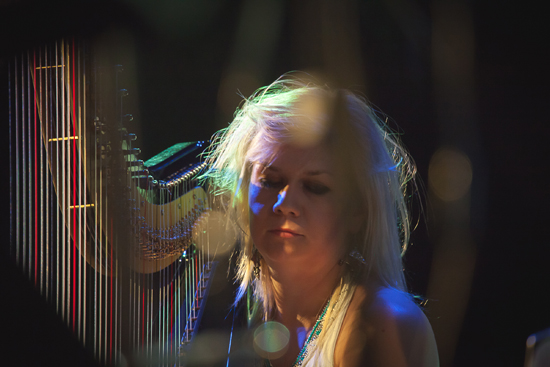
John Coltrane’s A Love Supreme Re-envisioned
Queen Elizabeth Hall
It’s been over fifty years since John Coltrane took his legendary Quartet into Rudy Van Gelder’s studio to record his ‘declaration of allegiance to God’. The music that was to become A Love Supreme was deep and expansive, a result both of Coltrane’s spiritual quest and his search into musical traditions from across the world. When London flautist and arranger Rowland Sutherland and curator Paul Bradshaw (ex-editor of Straight No Chaser magazine) began to envisage a new interpretation of the original score, their horizons were equally broad. The result was to be a ‘re-envisioning’ of Coltrane’s iconic album with a fifteen-piece ensemble of master musicians from the many corners of global music spectrum. But before A Love Supreme, we are to be treated to a set of ‘Deep Vibes’ from some of the musicians involved in this ambitious project. One of the original jazz warriors involved tonight, Byron Wallen, opens proceedings with the bellowing call of a huge Tibetan horn. It proves a fitting introduction to a set of border-crossing jazz that takes in the Gnawa influenced modality of Wallen’s ‘Spirit Of Bilal’ and the Eastern impressionism of Japanese flautist Emi Watanabe. The set ends with a four number tribute to Sun Ra. Both languid and out-there, it’s a powerful performance that inhabits the freakier edges of Ra, thanks to Pat Thomas’ keys/electronics and Orphy Robinson’s Xylosynth.
Biographer Ashley Kahn called Coltrane’s album "a public spiritual disrobing". This is something the collective must have had in mind when working on this project. Rather than attempting a recreation of this most personal piece of music (as others like Branford Marsalis had done), this collective sets out to explore and experiment with Coltrane’s inspired vision in the second set. In continuing the expansive direction Coltrane was taking before his death in 1967, Sutherland looked to a live recording of A Love Supreme at the Antibes Jazz Festival in 1965. The ferocity of Coltrane’s horn on that album is certainly something tenorist Steve Williamson and bass clarinettist Shabaka Hutchings strive for tonight. Newly composed parts from Sutherland combine with the original themes, as Bata drums and assorted Eastern instruments combine to stunning effect. Pat Thomas is particularly creative, working his electronic pulsations against Nikki Yeoh’s searching piano. When Orphy Robinson steps from behind his electric marimba to conduct the mighty noise of the ensemble, the power is truly breathtaking. A fitting end to Meltdown in the QEH. Andy Thomas
